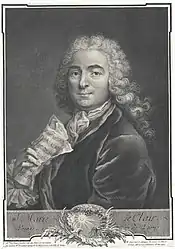Jean-Marie Leclair
Jean-Marie Leclair l'aîné (Jean-Marie Leclair the Elder; 10 May 1697 – 22 October 1764) was a French composer, violinist, and dancer.
Jean-Marie Leclair | |
|---|---|
 | |
| Born | Jean-Marie Leclair l'aîné 10 May 1697 |
| Died | 10 October 1764 (aged 67) |
| Occupation(s) | violinist, composer |
Life
Leclair was born in Lyon. He was his parent's oldest child. At least three of his brothers became musicians.[1]
He learned to play the violin and dance. He taught ballet at the Théâtre-Royal of Turin. On November 9, 1716 he married Marie-Rose Casthagnié, a dancer. Leclair went to Paris in 1723. He published his first works in Paris. He also performed at the Concert Spirituel.[2]
After Leclair's first wife had died, he married again in 1730. King Louis XV made Leclair ordinaire de la musique du roi in 1733.[2] He wrote a book of violin sonatas for the King.[1] Leclair left the musique du roi in 1737. He had an argument with Jean-Pierre Guignon about who should lead the orchestra. He did not want to become the second violinist. So, he left the orchestra.[2]
From 1738 to 1743, Leclair worked for Anne, Princess of Orange. He wrote a set of violin sonatas for the princess. He also worked as a maestro di cappella for François Du Liz. However, Du Liz went bankrupt in 1743. Leclair returned to Paris. He published his last set of violin sonatas in 1743. In 1746, he wrote an opera, called Scylla et Glaucus. It was his only opera.[2]
On October 23, 1764, his gardener found Leclair dead in his house. He had been stabbed three times. His murderer is not known. However, the police suspected that Leclair's nephew, François Guillaume Vial, killed him.[3]
References
- Pougin, Arthur (1924). Le Violon, les violonistes et la musique de violon du XVIe au XVIIIe siècle / Arthur Pougin (in French). Fischbacher. pp. 188–218.
- Zaslaw, Neal (2001). "Leclair, Jean-Marie". Grove Music Online (8th ed.). Oxford University Press.
- Borowitz, Albert (1986). "Finale Marked Presto: The Killing of Leclair". The Musical Quarterly. 72 (2): 228–238. doi:10.1093/mq/LXXII.2.228. ISSN 0027-4631. JSTOR 948121.